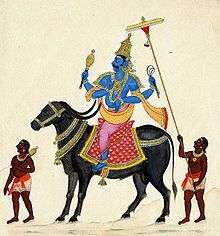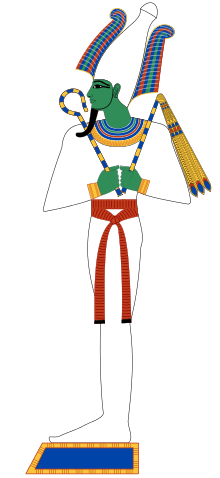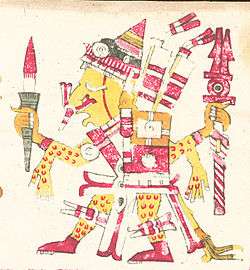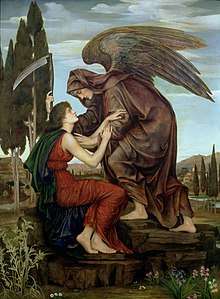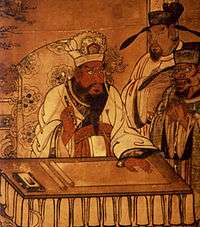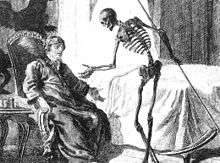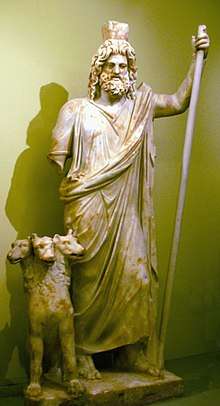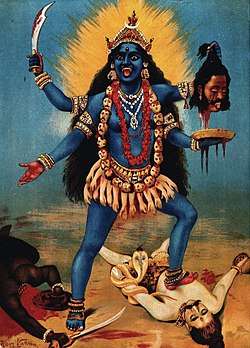List of death deities
.jpg)
Deities associated with death take many different forms, depending on the specific culture and religion being referenced. Psychopomps, deities of the underworld, and resurrection deities are commonly called death deities in comparative religions texts. The term colloquially refers to deities that either collect or rule over the dead, rather than those deities who determine the time of death. However, all these types are included in this article.
Many have incorporated a god of death into their mythology or religion. As death, along with birth, is among the major parts of human life, these deities may often be one of the most important deities of a religion. In some religions with a single powerful deity as the source of worship, the death deity is an antagonistic deity against which the primary deity struggles. The related term death worship has most often been used as a derogatory term to accuse certain groups of morally abhorrent practices which set no value on human life.
Occurrence
In polytheistic religions or mythologies which have a complex system of deities governing various natural phenomena and aspects of human life, it is common to have a deity who is assigned the function of presiding over death. The inclusion of such a "departmental" deity of death in a religion's pantheon is not necessarily the same thing as the glorification of death which is commonly condemned by the use of the term "death-worship" in modern political rhetoric.
In the theology of monotheistic religion, the one god governs both life and death. However, in practice this manifests in different rituals and traditions and varies according to a number of factors including geography, politics, traditions and the influence of other religions.
African mythology
- Ala (Igbo mythology)
- Eshu (Yoruba religion)
- Iku (Yoruba religion)
- Ogbunabali (Igbo mythology)
- Anubis (Egyptian mythology), guardian of the dead,[1] mummification and the afterlife in ancient Egyptian religion
- Osiris (Egyptian mythology), lord of the Underworld[2]
- Nephthys (Egyptian mythology), Anubis' mother; sister of Osiris; also a guardian of the dead. She was believed to also escort dead souls to Osiris.
- Seker (Egyptian mythology), a falcon god of the Memphite necropolis who was known as a patron of the living, as well as a god of the dead. He is known to be closely tied to Osiris.
- Hermanubis (Egyptian mythology), a conductor of souls
- Aker (Egyptian mythology)
- Aqen (Egyptian mythology)
- Andjety (Egyptian mythology)
- Duamutef (Egyptian mythology)
- Hapi (Egyptian mythology)
- Imiut fetish (Egyptian mythology)
- Imset (Egyptian mythology)
- Kherty (Egyptian mythology)
- Qebehsenuef (Egyptian mythology)
- Medjed (Egyptian mythology)
American mythology
- Mictecacihuatl (Aztec mythology),[3] the chief death goddess; Queen of Mictlan (underworld) or Lady of the Dead
- Mictlantecuhtli (Aztec mythology), the chief death god; lord of the Underworld[4]
- Cihuateteo (Aztec mythology), dead, roaming spirits; envoys of Mictlan
- Coatlicue (Aztec mythology), minor goddess of death, as well as the goddess of life and rebirth
- Itztlacoliuhqui (Aztec mythology), personification of winter-as-death
- Tlaloc (Aztec mythology), water god and minor death god; ruler of Tlalocan, a separate underworld for those who died from water-related death
- Xipe Totec (Aztec mythology), hero god, death god; inventor of warfare and master of plagues
- Xolotl (Aztec mythology), god of sunset, fire, lightning, and death
- Guédé or Ghede (Haitian Vodou)
- Ghede Nibo (Haitian Vodou)
- Baron Samedi, Baron La Croix, Baron Cimetiere, Baron Kriminel (Haitian Vodou)
- Maman Brigitte (Haitian Vodou)
- Camazotz
- Ixtab
- Xtabay
- Maya death gods known under various names (Hunhau, Uacmitun Ahau, Kisin, Yum Kimil) Lord of Underworld in Maya mythology
- El Tío, lord of the underworld, in Cerro Rico, Bolivia
- Anguta, gatherer of the dead, Inuit mythology
- Chepi
- Aipaloovik, Inuit mythology
- Pana, Inuit mythology
- Luison, Guarani mythology
- Muut, Native American mythology
- Maximón
- San Pascualito
- Santa Muerte
- San La Muerte
- Ta'xet, Haida mythology
- Maquetauire Guayaba [Taino]
- Opiel Guabiron [Taino]
- Supay (Inca mythology)
- Vichama (Inca mythology)
Near East Mythology
- Ereshkigal (Babylonian mythology),[5][6] first lady of the Underworld
- Nergal (Babylonian mythology), second lord of the Underworld[7]
- Angra Mainyu or Ahriman, the destructive spirit (Persian mythology)[8]
- Asto Vidatu or Astiwihad or Asto-widhatu, death deity (Persian mythology)[9]
- Aminon, Gatekeeper of the underworld (Ossetian mythology)
- Abaddon, the Destroyer (Judaism, Christianity)
- Azrael, Archangel of Death (Judaism, Christianity, Islam, Sikhism)
- Adriel (Judaism, Christianity)
- Samael (Judaism, Christianity)
- Death (Christianity)
- Nāzi'āt and Nāshiṭāt (Islam)
- Dumah (Judaism)
- Destroying angel (Judaism)
- Barastyr, the ruler of the underworld (Ossetian mythology)
- Erlik (Turkic mythology)
- Mot (Canaanite)
- Jabru (Elamite mythology)
- Namtar (Mesopotamian mythology)
- Ninsusinak (Assyrian mythology)
East and South East Asian mythology
- Batara Kala (Balinese mythology), god of the underworld in traditional Javanese and Balinese mythology, ruling over it in a cave along with Setesuyara. Batara Kala is also named the creator of light and the earth. He is also the god of time and destruction, who devours unlucky people. He is related to Hindu concept of Kala, or time. In mythology, he causes eclipses by trying to eat the Sun or the Moon.
- Kumakatok (Philippines), hooded and cloaked harbingers of death that would knock on doors of the dying
- Pong Lalondong (Toraja), god of death
- Shinigami (Shinto), a demon that would possess humans making them want to die. It is said that upon being possessed, the victim would suddenly wish to commit suicide.
- Izanami (Shinto)
- Shingon (nat) (Burmese)
- Sidapa (Philippines), god of the death and lifespan in traditional Visayan mythology; resides in Mt. Majaas. Sidapa is prominently known for defeating the other gods in order to take a Bulan boy to be his consort or child-bride.
- Magwayen (Philippines), the goddess of afterlife and the first ocean deity, according to Cebuano and Hiligaynon legends. Known for being the goddess who collects souls and takes them to Sulad with her boat.
- Yamantaka (Vajrayana Buddhism)
- Erlik, the god of death and underworld in Turkic and Mongolian mythology.
Chinese Mythology
Emperor(s) of Youdu (Capital City of the Underworld)
- Yin Changsheng
- Wang Yuan
- Yan Luo (Buddhist/Chinese Yama)
- Jiang Ziwen
Kings of the Ten Underworld Palaces
- Chiang Ziwen
- Bao Zheng
- Dong Ji
- Huang Xile
The rest only have surnames including Li, Yu, Lu, Bi, Lu and Xue.
Four Kings of the Underworld
- Bao Zheng
- Han Qinhu
- Fan Zhongyan
- Kou Zhun
Ghost Kings of the Five Regions
- Cai Yulei
- Zhao He
- Zhang Heng
- Duzi Ren
- Zhou Qi
Ghost Kings of the Five Regions (Ver.2)
- Shen Cha
- Yang Yun
- Yan Di (Shenlong)
- Ji Kang
- Immortal Wang
Governors of Fengdu
- Deng Ai
- Ji Ming
Imperial Censor of Fengdu
- Han Yi
- Zeng Yuanshan
- Jiao Zhongqing
- Ma Zhong
- Song Youqing
- Guan Yu (note: different from the famous general of three kingdoms)
- Wu Lun
- Tu Cha
Four Generals of the Direct Altar of Fengdu
- Ma Sheng
- Ma Chuanzhong
- Chen Yuanbo
- Guo Zhongyou
Eight Generals of the Inner Altar of Fengdu
- Wei Tin, Ghost Capturing General
- Liu Chu, Ghost Restraining General
- Wang Jian, Ghost Flailing General
- Meng E, Ghost Interrogating General
- Che Zi, Guardian of the East Gate
- Xia Dali, Guardian of the West Gate
- Lie Weizhi, Guardian of the South Gate
- Sang Tongguai, Guardian of the North Gate
Eight Generals of the Outer Altar of Fengdu
- Zhang Yuanlian
- Chen Yuanqing
- Li Yuande
- Fan YuanZhang
- Du YuanZhen
- Liu Yuanfu
- Chang Yuan
- Jia Taoyuan
Ten Masters of the Underworld
- A Bang, Bull Head
- Luo Cha, Horse Face
- Xie Bian, Wondering God of the Day
- Fan Wujiu, Wondering God of the Night
- Hei Wuchang (Black Impermanence)
- Bai Wuchang (White Impermanence)
- Huangfeng (responsible for insects)
- Paowei (responsible for animals)
- Yusai (responsible for fishes)
- Guaiwang (responsible for Hungry Ghosts)
(Note: in some versions, Xie Bian and Fanjiu are the He Wuchang and Bai Wuchang.)
Four Strongmen of Fengdu
- Zhang Yuanzhen, Taiyi Strongman
- Hu Wenzhong, Tri-day Strongman
- Sun Zhongwu, Demon-smiting Strongman
- Tang Bocheng, Ghost-smiting Strongman
Two Agents of Fengdu
- Xun Gongda, Great God of the Black Sky
- Liu Guangzhong, Great God of the Black Fog
Wardens of the Nine Prison of Fengdu
- Wang Yuanzhen
- Zhen Yan
- Yao Quan
- Shi Tong
- Zhou Sheng
- Diao Xiao
- Kong Sheng
- Wu Yan
- Wang Tong
Administers of the Six Paths of Rebirth of Fengdu
- Cao Qing, Administer of the Path of Heaven
- Tien Yan, Administer of the Path of Ghosts
- Cui Cong, Administer of the Path of Earth
- Ji Bie, Administer of the Path of Gods
- Chen De, Administer of the Path of Hungry Ghosts
- Gao Ren, Administer of the Path of Beasts
Judges of Fengdu
- Cui (Chief Judge)
- Wang Fu
- Ban Jian
- Zi He
- Jia Yuan
- Zhao Sheng
- Zhang Qi
- Yang Tong
- Fu Po
- Zhu Shun
- Li Gong
- Xue Zhong
- Rong Zhen
- Lu Zhongce
- Chen Xun
- Huang Shou
- Zhou Bi
- Bian Shen
- Cheng De
- Liu Bao
- Dong Jie
- Guo Yuan
Korean Mythology
Sacha Bonpuri
- Yeomra, King of the Underworld
- Shiwang, the Ten kings of the Underworld
- Daebyeol, Supreme King of the Underworld
Jeoseung Sacha, gods/messengers of death
- Gangnim Doryeong, leader of the Death Gods
- Hwadeok Sacha, Reaper of Death in Fire
- Yonggung Sacha, Reaper of Death at Sea
- Danmul Sacha, Reaper of Death in Wells
- Tusok Sacha, Reaper of Death by Rock or Stone
Jangseung, Korean totem poles
- Cheonha Daejanggun, village guardian and the Great General of all under Heaven
- Jihayeojanggun, village guardian and the Great General of the Underworld
European mythology
- Ankou (Breton people)
- Azyren (Mari people)
- Grim Reaper, Europe, personification of death
- Erio (Basque mythology)
- Giltinė (Lithuanian mythology)
- Ishtar-Deela Nakh, Lord of the Underworld[10]
- Māra (Latvian mythology)
- Morana (Slavic mythology)
- Banshee (Irish Mythology)
- Dullahan (Irish Mythology)
- Cu Sith (Scottish folklore)
- Black Shuck (English Mythology)
- Black Dog (ghost) (British Isles)
- Chernobog (Slavic mythology)
- Djall (Albanian mythology)
- Horned God (Wicca)
- Xargi (Siberian mythology)
- Peckols (Prussian mythology)
- Peklenc (Slavic mythology)
- Veles (Slavic mythology)
- Nga (Siberian mythology)
- Hades (Greek mythology), king of the Underworld[11]
- Persephone (Greek mythology), queen of the Underworld; wife of Hades and goddess of spring growth[12]
- Thanatos (Greek mythology), god of death[13]
- Macaria (Greek mythology), goddess of the blessed death (not to be confused with the daughter of Heracles)[14]
- Melinoe (Greek mythology), goddess of propitiation
- Angelos (Greek mythology), a daughter of Zeus and Hera who became an underworld goddess
- Lampades (Greek mythology), torch-bearing Underworld nymphs
- Gorgyra (Greek mythology)[15]
- Orphne (Greek mythology), a Lampad nymph of Hades, mother of Askalaphos
- Erebus (Greek mythology), the primeval god of darkness, his mists encircled the underworld and filled the hollows of the earth
- Tartarus (Greek mythology), the darkest, deepest part of the Underworld
- Keres (Greek mythology), goddesses of violent death, sisters of Thanatos
- Keuthonymos (Greek mythology), an Underworld spirit and father of Menoetes
- Lamia (Greek mythology), a vampiric Underworld spirit or spirits in the train of Hecate
- Menoetes (Greek mythology), an Underworld spirit who herded the cattle of Hades
- Mormo (Greek mythology), a fearsome Underworld spirit or spirits in the train of Hecate
- Styx (Greek mythology), goddess of the river Styx, a river that formed a boundary between Earth and the Underworld, one of the seven rivers of the Underworld
- Acheron (Greek mythology), god of the river Acheron, one of the seven rivers of the Underworld
- Alpheus (Greek mythology), god of the river Alpheus, one of the seven rivers of the Underworld
- Cocytus (Greek mythology), god of the river Cocytus, one of the seven rivers of the Underworld
- Eridanos (Greek mythology), god of the river Eridanos, one of the seven rivers of the Underworld
- Lethe (Greek mythology), goddess of the river Lethe, one of the seven rivers of the Underworld.
- Phlegethon (Greek mythology), god of the river Phlegethon, one of the seven rivers of the Underworld.
- Charon (Greek mythology), Ferryman of Hades
- Erinyes (Greek mythology), Chthonic deities of vengeance
- Rhadamanthus (Greek mythology), judge of the dead
- Minos (Greek mythology), judge of the dead
- Aeacus (Greek mythology), judge of the dead
- Atropos (Greek mythology), one of the three Moirai associated with death
- Clotho (Greek mythology), one of the three Moirai
- Lachesis (Greek mythology), one of the three Moirai
- Hermanubis (Greek mythology), a conductor of souls
- Dis Pater (Roman mythology), god of the underworld
- Proserpina (Roman mythology), Queen of the underworld
- Mania (Roman mythology), goddess of death
- Mors (Roman mythology), personification of death
- Orcus (Roman mythology), punisher of broken oaths; usually folded in with Pluto
- Pluto (Roman mythology), ruler of the Underworld
- Di inferi (Roman mythology), ancient Roman deities associated with death and the Underworld
- Viduus (Roman mythology), god who separated the soul and body after death
- Dea Tacita (Roman mythology), goddess of the dead.
- Morta (Roman mythology), Goddess of the dead, and one of the three Parcae
- Nenia Dea (Roman mythology), goddess of funerals
- Soranus (Roman mythology), Underworld Sabine god adopted by the ancient Romans
- Manes (Roman mythology), spirits of the dead
- Lemures (Roman mythology), the malevolent dead
- Libitina (Roman mythology), goddess of funerals and burial
- Odin (Norse mythology)[16][17] presides over Valhalla, and chooses half of those who die in battle to be escorted by Valkyries to spend their afterlife there.
- Freya (Norse mythology), presides over Fólkvangr; chooses half of those who die in battle to spend their afterlife there
- Hel (Norse mythology),[16][17] goddess of the dead and queen of Helheim
- Rán (Norse Mythology) goddess who gathers the drowned in her nets
- Tuoni (Finnish mythology), with his wife and children[18]
- Kalma, Finnish goddess of death and decay, her name meaning "the stench of corpses" [19]
- Arawn (Celtic mythology)
- Cichol (Celtic mythology)
- Crom Cruach (Celtic mythology)
- Donn (Celtic mythology)
- Mannanan (Celtic mythology)
- The Morrigan (Celtic mythology)
- Aita (Etruscan mythology), god of the underworld
- Culga (Etruscan mythology), a female underworld spirit
- Februus (Etruscan mythology), god of purification, death, the underworld, and riches
- Mani (Etruscan mythology), spirits of the dead
- Mania (Etruscan mythology), goddess of the dead
- Mantus (Etruscan mythology), god of the underworld
- Orcus (Etruscan mythology), god of the underworld
- Tuchulcha (Etruscan mythology), an underworld daemon
- Vanth (Etruscan mythology), winged daemon of the underworld
Hindu mythology
Pacific Islands mythology
- Hine-nui-te-pō (Maori mythology)
- Whiro (Maori mythology)
- Wuluwaid (Australian Aboriginal mythology)
- Degei (Fijian mythology)
In fiction
Death is the protagonist in the science fantasy novel On a Pale Horse, book one in a series of 8 books, the "Incarnations of Immortality".
In the novel The Book Thief Death is the narrator of the story.
Death is the name of one of "The Endless" in the DC Universe.
Death is a recurring character in the Discworld series written by Terry Pratchett. Books featuring Death include Mort, Reaper Man, Soul Music, Hogfather and Thief of Time. He also makes a cameo appearance in Interesting Times.
In A Song of Ice and Fire by George R.R. Martin, the guild of assassins known as the Faceless Men believe that all death deities are simply different incarnations of the same god, known to them as the Many-Faced God or Him of Many Faces, while the Faith of the Seven worships The Stranger as one of Seven Aspects of God representing Death and the Unknown.
In the works of J. R. R. Tolkien, especially The Silmarillion, Nàmo AKA Lord Mandos is the Doomsman of the Valar, Judge of the Dead and Lord of the Halls of Mandos (where Elves await reincarnation and humans retreat before making the Journey into the Beyond), similar to Hades.
In the CW TV show Supernatural, Death makes a crucial appearance. He is portrayed as existing alongside God since the beginning of time, and being so ancient he cannot remember when he came into existence; he may even be older than God. In the show he is the oldest and most powerful, of the Four Horsemen - Death, Famine, War and Pestilence. He is not portrayed as a villain.
In the manga and anime of the popular hit series Sailor Moon, the tenth and last Sailor Soldier of the Moon Kingdom, Sailor Saturn, is the Sailor Soldier of all silence, destruction, oblivion, nothingness, ruin, and death. Her weapon is the Silent Glaive that is capable of utterly obliterating and destroying entire worlds and planets if used to its maximum potential.
In the Marvel Comics Universe, the personification of death is Mistress Death.
The Transformers mythos features the character of Mortilus, a Cybertronian deity who represents death and who later betrayed his brethren and was destroyed, leading to the longevity of the Transformer race. A similar character is The Fallen, a member of the Thirteen Primes who is identified as the guardian of entropy.
In the manga and anime, "Death Note", gods of Death (Shinigami) exist in the shinigami realm and are owners of death notes, which are used to kill humans. When a note falls in the human world, the person who touches it first becomes the new owner of the note, can recognize the god of death to whom it belongs and the god follows him/her for the rest of his/her life
See also
References
- ↑ "Archived copy". Archived from the original on 2012-10-26. Retrieved 2012-10-30.
- ↑ "Archived copy". Archived from the original on 2012-05-26. Retrieved 2012-10-30.
- ↑ http://www.goddessaday.com/mayan/mictecacihuatl
- ↑ http://www.azteccalendar.com/god/Mictlantecuhtli.html
- ↑ "The counterpart to these deities of sky, air, water, and earth was the underworld, the realm of the dead, originally seen as ruled by the powerful Goddess Ereshkigal." Ruether, Rosemary Radford. Goddesses and the Divine Feminine: A Western Religious History. Berkeley: University of California Press. ISBN 0-520-23146-5
- ↑ "After consulting his mistress Ereshkigal, the queen of the Nether World, he admits Ishtar" Kramer, "Ishtar in the Nether World According to a New Sumerian Text" Bulletin of the American Schools of Oriental Research. 1940. Google scholar results as the JSTOR link is unlikely to be universally available.
- ↑ "Nergal - www.GatewaysToBabylon.com". www.gatewaystobabylon.com. Retrieved 25 March 2018.
- ↑ Duchesne-Guillemin, Jacques (1982), "Ahriman", Encyclopaedia Iranica, 1, New York: Routledge & Kegan Paul, pp. 670–673
- ↑ Micha F. Lindemans (27 July 1997), "Asto Vidatu", Encyclopedia Mythica
- ↑ Jaimoukha, Amjad M. (2005-03-01). The Chechens: a handbook (1st ed.). Routledge. p. 110. ISBN 978-0-415-32328-4. Retrieved 2009-08-14.
- ↑ A page describing Hades.
- ↑ "Classical Mythology: Hades Takes a Wife: Persephone". InfoPlease. Retrieved 25 March 2018.
- ↑ "THANATOS - Greek God of Death (Roman Mors)". www.theoi.com. Retrieved 25 March 2018.
- ↑ "MACARIA (Makaria) - Greek Goddess of Blessed Death". www.theoi.com. Retrieved 25 March 2018.
- ↑ "GORGYRA ORPHNE - Underworld Daemon or Nymph of Greek Mythology". www.theoi.com. Retrieved 25 March 2018.
- 1 2 Kveldulf Gundarsson. (1993, 2005) Our Troth. ISBN 0-9770165-0-1
- 1 2 The dwelling one went to after death varied depending on where one died, at the battlefield or not. If not at the battlefield, one would go to Hel (not to be confused with the Christian Hell). Of the slain at the battlefield, some went to Folkvang, the dwelling of Freyja and some went to Valhalla, the dwelling of Odin (see Grímnismál). The ninth hall is Folkvang, where bright Freyja. Decides where the warriors shall sit. Some of the fallen belong to her. And some belong to Odin.
- ↑ "TUONI - the Finnish God of the Underworld (Finnish mythology)". godchecker.com. Retrieved 25 March 2018.
- ↑ "KALMA - the Finnish Goddess of Death (Finnish mythology)". godchecker.com. Retrieved 25 March 2018.
